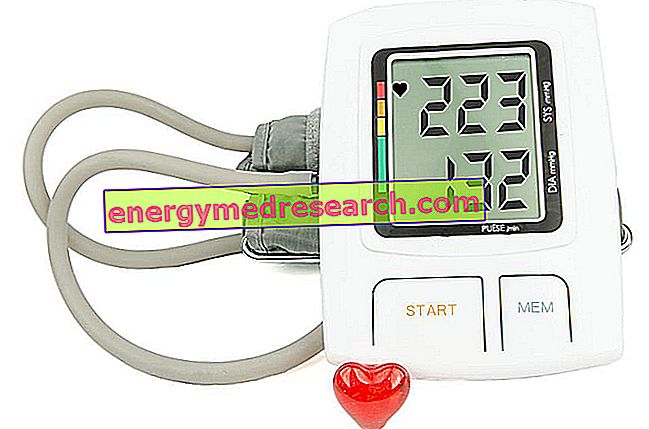Related articles: Hypertension Definition Blood pressure depends on the amount of blood pumped from the heart and the resistance it encounters when it flows into the arteries. As these factors increase there is a rise in blood pressure. In more than 90% of cases hypertension manifests itself without any apparent cause (it is said idiopathic or essential), while in the remaining percentage of cases there are predisposing factors, such as renal and endocrine diseases
Category hypertension
Watch the video X Watch the video on youtube High Blood Pressure - Hypertension High blood pressure is a disorder that affects over 10 million people, of which only ¼ can keep it under control. From the medical point of view, high blood pressure is indicated by the term hypertension and is defined as such when there is a permanent increase in ARTERIUM pressure, above the values considered normal. Spe
Premise The following indications are for information purposes EXCLUSIVELY and are not intended to replace the opinion of professional figures such as doctor, nutritionist or dietician, whose intervention is necessary for the prescription and composition of CUSTOMIZED food therapies. Lower the pressure Lowering blood pressure is a useful measure to reduce cardiovascular risk since those suffering from high blood pressure are more likely, compared to healthy subjects, to incur in inauspicious events such as stroke and myocardial infarction
INTRODUCTION Blood pressure, or blood pressure, is the force exerted by the blood against the vessel walls (arteries, veins and capillaries); the unit of measurement with which the values are expressed is the millimeter of mercury, marked mmHg , while the instruments that evaluate it are: the sphygmomanometer, the intra-vascular pressure catheterization and the Holter ElettroCardioGramma (ECG). Bl
Definition One speaks of hypertension when the values of minimum arterial pressure (diastolic) exceed 90 mmHg and those of maximum arterial pressure (systolic) exceed 140 mmHg; this definition is not completely correct, given that, to define itself as "hypertensive", a subject must maintain this alteration of blood pressure values in a constant manner. Causes
In medicine, the term malignant hypertension is used to indicate a serious morbid condition, characterized by an increase in sudden and high blood pressure . In fact, in the presence of malignant hypertension it is possible to observe arterial pressure levels higher than 180/120 mmHg (NB: the first value is the systolic, or maximum pressure; the second value is the diastolic, or minimal, pressure), far exceeding not only at normal blood pressure levels (115/75 mmHg) but also at those of moderate-stage hypertension (140/90 mmHg)
Malignant hypertension refers to an abnormal increase in mean arterial pressure, so consistent as to cause serious damage to the eye, and beyond. The adjective "malignant" is therefore not referred to a hypothetical cancerous origin, but to the serious damages that this syndrome can cause. If left untreated, malignant hypertension is in fact aggravated by a mortality of more than 90% over a year
Blood pressure is different in the arterial and venous circulation. Between the two, the flow most frequently subjected to pathological changes is the arterial flow, which exerts maximum and minimum pressure on the vessel wall (systolic and diastolic). Of the two pressure values, the one considered "most important" is that of minimum pressure
Generality The Holter blood pressure is a diagnostic procedure of the total duration of 24 hours, which, through the use of a portable sphygmomanometer, allows to measure the arterial pressure of an individual every 30 minutes. Image from the site www.oncallmedicalsupplies.co.uk The portable sphygmomanometer is very similar to a classic sphygmomanometer for standard pressure measurement
Related articles: Hypertension Definition Blood pressure depends on the amount of blood pumped from the heart and the resistance it encounters when it flows into the arteries. As these factors increase there is a rise in blood pressure. In more than 90% of cases hypertension manifests itself without any apparent cause (it is said idiopathic or essential), while in the remaining percentage of cases there are predisposing factors, such as renal and endocrine diseases
Related articles: Hypertension Definition Hypertension is the protracted increase in blood pressure values, measured at rest, beyond the 140 mm of mercury (mmHg) for the maximum and 90 mmHg for the minimum. In most cases, high blood pressure does not produce characteristic symptoms, so attention must be paid to generic signals that may lead to suspicion










